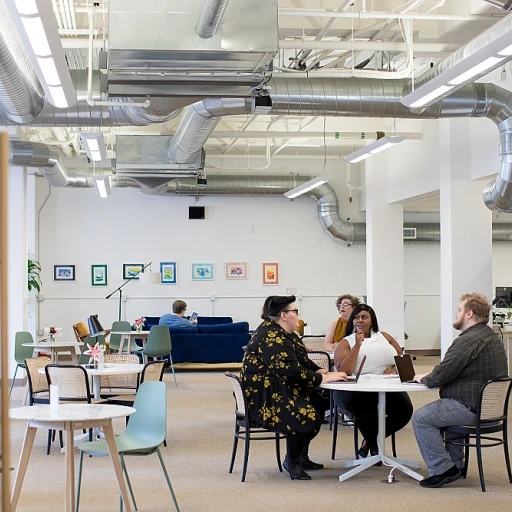
The Evolving Role of Workplace Leaders
Redefining Leadership in Modern Workplaces
The role of workplace leaders has evolved significantly as business environments continue to change. Today’s managers are not only tasked with traditional responsibilities but must also navigate challenges like hybrid work environments, technology integration, and evolving employee expectations. Contemporary leadership in the office space involves adopting innovative HR practices that align with the rapidly changing demands of both employees and the broader business landscape.
In the era of remote and hybrid work, workplace managers must be adept in utilizing management technology tools and software solutions to maintain seamless operations. This involves understanding real-time data analytics for effective space utilization and optimizing the work environment to enhance office experience for employees. By embracing such systems, managers can ensure that both remote and in-office workers experience a cohesive and efficient work dynamic.
However, as the workplace experience becomes more reliant on technology, it's vital for managers to balance digital integration with developing soft skills. Building empathy, fostering innovation, and maintaining a positive workplace culture are equally important. This shift towards an employee-centric approach helps leaders to understand and respond to the varied needs of their teams, thus promoting a workplace management environment where everyone can thrive.
For those looking to explore further, the significance of evolving leadership roles in the workplace is discussed in greater detail in the article Revolutionizing Employee Evaluation, which reveals the broader implications of innovative HR strategies on leadership. By integrating these insights, workplace leaders can not only enhance their competence but also extend their influence throughout the organization.
Leveraging Technology for Enhanced Team Management
Transformative Tools for Managers in the Workplace
In today's fast-evolving business environment, the role of workplace managers has expanded, particularly with the rise of technology solutions tailored for office management. Whether managing hybrid work models or ensuring optimal space utilization, leveraging technological advancements can significantly enhance management capabilities.
Rather than traditional management methods, innovative workplace management technologies provide managers with tools to efficiently oversee both on-site and remote employees. Integrating workplace management software can optimize employee work environments, combining smart systems for seamless login experiences with real-time data analytics to track and enhance productivity.
Moreover, security and privacy policies are paramount in maintaining a healthy office culture. Advanced software solutions not only ensure compliance with privacy standards but also foster a safe and productive work environment. This balance creates a conducive space where both employees and managers thrive, boosting overall business office success.
As we move towards more integrated workspaces, technology that supports hybrid work configurations has become indispensable. By harnessing these tools, managers not only improve their efficiency but also facilitate a robust workplace experience that aligns with the evolving demands of the modern work landscape.
Fostering a Culture of Innovation
Encouraging an Inventive Atmosphere
Fostering a culture of innovation within the workplace is a vital strategy for any forward-thinking business. Organizations need to create an environment where employees feel empowered to share their ideas and think creatively. By doing so, businesses can harness the full potential of their employees, leading to enhanced productivity and a more dynamic work environment. Implementing smart systems and data analytics can radically transform office management by providing insights into space utilization and identifying areas that need improvement. Workplace managers can use this information to create an adaptable and inspiring office space that meets the needs of their staff. Programs that encourage participation and collaboration among employees are crucial. One way to achieve this is by integrating technology into work programs, such as utilizing management software to improve communication and streamline project management. This not only boosts team productivity but also improves the overall workplace experience. A hybrid workplace model can also support innovative cultures. By allowing employees to alternate between remote and in-office work, organizations can provide flexibility while maintaining an energetic office atmosphere. This hybrid work approach can refine the balance between personal productivity and teamwork, as it encourages diverse work dynamics that cater to individual employee preferences and work styles. It is important to remember that management technology should respect employees' privacy and comply with the privacy policy set by the organization. Ensuring data security and health-related measures further solidifies trust, enabling employees to feel safe and valued in their work environment. For workplace managers aiming to encourage creative thinking, crafting effective phrases for performance reviews can significantly impact how employees perceive their work value and contribution. For practical strategies and examples, check out this insightful guide on crafting effective phrases for teamwork and performance reviews.Data-Driven Decision Making in HR
The Power of Informed Decisions in HR
In today’s dynamic work environment, the ability to make informed decisions is vital. This is where data-driven decision-making comes to the fore, revolutionizing the approach of workplace managers. Utilizing advanced data analytics, organizations can gain invaluable insights into their workforce, impacting aspects such as team management, employee experience, and office space utilization. By effectively leveraging data, managers can track employee performance and satisfaction, identify trends, and address issues before they escalate. This proactive approach facilitates enhanced workspace management and ensures that resources are optimally allocated to promote a healthier work environment. Moreover, data-driven insights empower managers to tailor the workplace experience, creating a personalized environment that meets the unique needs of each employee. This strategy not only enhances overall well-being but also boosts productivity and engagement. Data systems can, for instance, analyze the effectiveness of hybrid work models by examining patterns in space utilization and employee work styles, helping office managers to strike the right balance between remote and in-office work. With data analytics, the privacy policy remains a significant consideration. It's essential to ensure that data collection does not compromise the security and privacy of employee information. Thus, HR must rigorously adhere to privacy standards while using technology to drive business office innovations. In essence, integrating smart management technology and systems with a focus on data-driven strategies enables managers to not only respond to the evolving demands of today’s workplace but also foster an environment conducive to sustainable growth and employee satisfaction.Personalized Employee Development Plans
Customizing Growth with Tailored Employee Plans
In the modern workplace, managers are recognizing the immense value in providing personalized employee development plans. These plans not only boost morale but also ensure the strategic growth of their teams. The workplace experience isn't just about fulfilling job descriptions; it's about creating an engaging environment that caters to individual aspirations and business goals.
To enhance this experience, managers can utilize management technology and sophisticated software systems. These tools offer data analytics that help in crafting tailored development programs aligned with an employee's unique strengths, interests, and career objectives. Such detailed insights enable office managers to better promote a culture of continuous learning and improvement within their spaces.
A progressive workplace necessitates an adaptable work environment. Managers workplace responsibilities now extend beyond simple task assignments; they must foster environments that encourage innovation and growth. By leveraging real-time data and workplace management technologies, businesses can ensure that employees receive relevant training while maintaining their privacy policy and data security.
Personalized development plans also play a significant role in enhancing overall work satisfaction, which is crucial in hybrid workplace settings. As businesses navigate the complexities of remote and in-office work dynamics, offering employees work plans that cater to their specific needs becomes pivotal. This approach not only optimizes space utilization within office spaces but also contributes to a healthier work environment, ultimately benefiting everyone involved in the management workplace.
Balancing Remote and In-Office Work Dynamics
Bridging the Gap: Creating a Cohesive Hybrid Work Environment
In today's rapidly shifting business landscape, the balance between remote and in-office work dynamics presents a unique challenge for managers. It's essential to establish strategies that enable seamless transitions and maintain productivity regardless of the work environment. Workplace managers must adopt smart, flexible solutions that cater to diverse employee preferences while ensuring an effective management workplace. To successfully integrate hybrid work models, consider the following strategies:- Maximize Space Utilization: Leverage data analytics to assess the use of office spaces and optimize for varied work patterns. Implementing such technology can help in prioritizing both employee needs and business objectives.
- Embrace Management Technology: Utilize workplace management software that facilitates communication and collaboration, promoting a connected work environment even from a distance. This enables employees to have real time access to vital business office resources and seamless interaction with their teams.
- Employee Health and Well-being: Foster a workspace that supports employee health. Design programs that prioritize well-being, allowing employees to choose the most comfortable work environment, be it remote or in-office.
- Advanced Security Systems: Invest in smart security solutions to protect sensitive data and uphold privacy policy standards in hybrid workplaces. This ensures that employees can work confidently, knowing that essential protocols are in place, irrespective of location.













